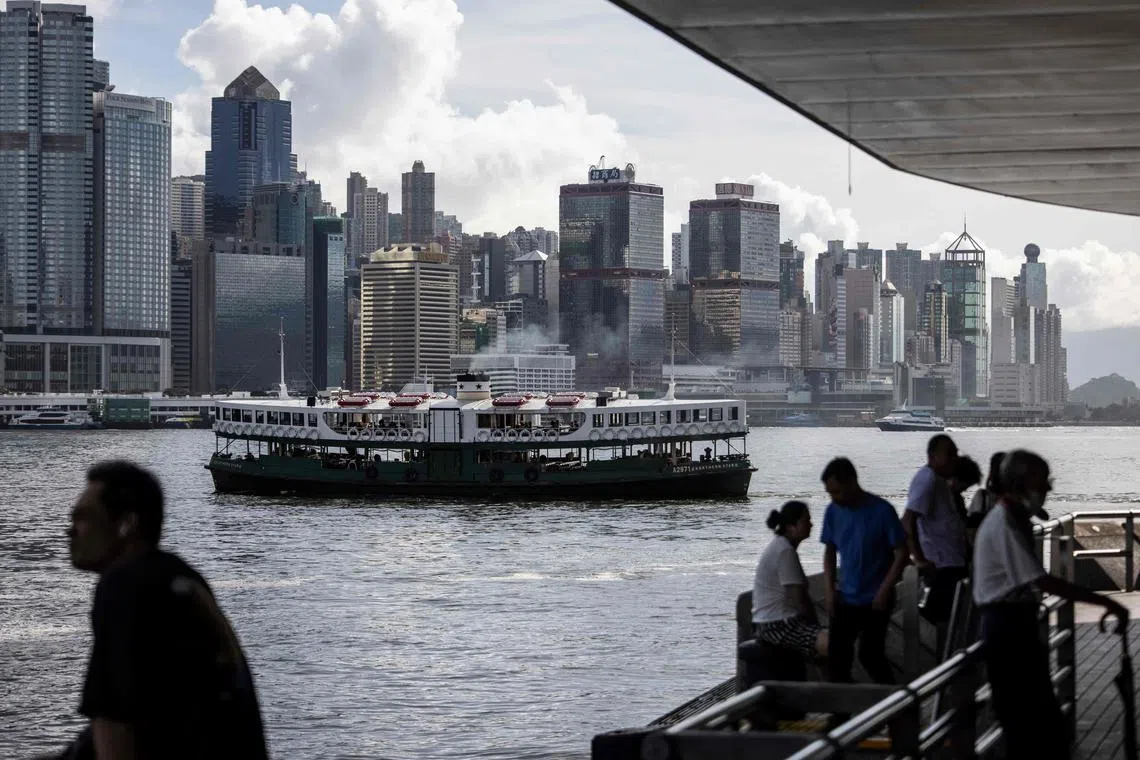Hong Kong’s battered property market lures Chinese state buyers
Sign up now: Get ST's newsletters delivered to your inbox

Chinese firms have become active real estate buyers in Hong Kong as local and international investors pull back.
PHOTO: AFP
Hong Kong - As Hong Kong’s commercial property slump drags on, Chinese state money has emerged as one of the few pillars of support.
Chinese firms have become active buyers in the city’s flailing real estate market, snapping up shopping malls and offices as local and international investors pull back. While deal sizes are smaller than during Hong Kong’s heyday six years ago, the purchases underscore the financial hub’s ever-increasing reliance on Chinese money.
China Resources Longdation, the property management arm of state-owned China Resources Holdings, has been buying retail space across Hong Kong, including a waterfront shopping mall for HK$540 million (S$90 million) in July and another retail podium for HK$310 million earlier in 2024. China Resources Longdation also made a HK$9 billion offer for the K11 Art Mall from New World Development, local newspaper Sing Tao reported, in what would be one of the largest commercial property deals in 2024.
“The timing is good” to buy prime retail properties in Hong Kong because the prices are low, said Mr Tom Ko, head of capital markets at Cushman & Wakefield’s Hong Kong office.
Chinese state-owned firms, with their relatively strong balance sheets and access to cheaper financing on the mainland, are able to take advantage of the recent downturn in the Asian financial hub, he added. Investors are getting returns, known as yield, of as much as 6 per cent on retail space, which was rare a few years ago, Mr Ko said.
The push by China’s state firms stands in contrast to traditional investors in Hong Kong, such as local tycoons and foreign property funds, that are mostly sitting on the sidelines. Banks’ reluctance to lend for commercial property and negative carry – where borrowing costs exceed the yield on the property – make it difficult for funds to invest, according to Mr Ko.
Hong Kong’s currency is pegged to the US dollar, and its monetary policy moves in line with the US Federal Reserve. The Hong Kong Monetary Authority’s base rate has been at 5.75 per cent for more than a year. Lenders in the city have prime lending rates that are higher than the benchmark. In mainland China, the one-year loan prime rate is significantly lower, at 3.35 per cent.
Sagging valuations are also keeping many investors away. At least HK$2.1 trillion has been erased from commercial and residential real estate values in the city since 2019, according to an analysis by Bloomberg Intelligence. Meanwhile, an increasing number of wealthy Hong Kong families are grappling with mounting debt and have to offload their properties at steep discounts to stay afloat.
That has provided more opportunities for Chinese state firms. China Telecom is among the bidders for a 15-storey office tower in Kowloon formerly owned by the beleaguered Chinese tycoon Chen Hongtian, according to a person familiar with the matter.
Sino United Publishing, a state-owned company, bought two office floors in the industrial district of Kwun Tong for HK$133 million in June, after acquiring a floor in a Wan Chai tower late in 2023 for HK$240 million.
Buyers in the current office market, including Chinese state-owned companies, are mostly end users of the space instead of investors, said Mr Oscar Chan, head of Hong Kong capital markets at Jones Lang LaSalle. The pullback by investors means the few remaining buyers are even more crucial to the ailing market than before.
Still, the modest influx of Chinese money has not been enough to turn around the struggling commercial market, which has been hammered by high borrowing costs, weak business sentiment and geopolitical concerns.
Office vacancy rates were at a record high of more than 16 per cent in the second quarter, with rents falling 35 per cent since the peak in 2019, according to Colliers International Group. An increase in office supply and downsizing by foreign firms including Goldman Sachs Group have crimped office demand.
The retail sector is also struggling, despite an influx of tourists. Retail sales in July decreased 12 per cent from a year earlier, and shop rents remain far below the height of the market a decade ago.
The weak outlook means Hong Kong will need to rely even more on China’s state-owned enterprises (SOEs) to prop up the market.
“It will not be surprising to see more involvement from Chinese SOEs in future real estate projects to provide de facto support to Hong Kong,” said Natixis senior economist Gary Ng.
“There are both economic and political rationales behind it,” he added. BLOOMBERG


